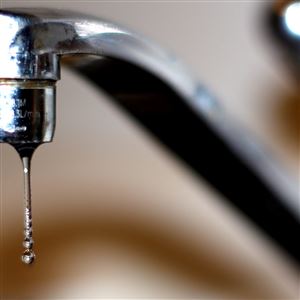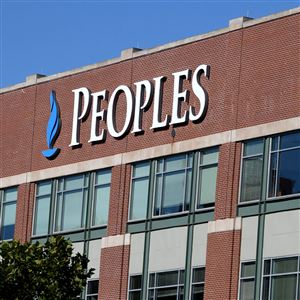For a while now, but especially in the past few months, North Shore-based Peoples Natural Gas has been trying to get into the water utility business.
And for maybe just as long, also ramping up in recent months, one of Pennsylvania’s largest water utility businesses has been trying to get into Peoples Natural Gas.
On Tuesday, Aqua America Inc., a Bryn Mawr-based publicly traded water company announced it would buy Peoples in a $4.275 billion deal.
The deal was not designed to achieve cost efficiencies and won’t affect rates or employees at either company, Aqua said.
Some of the same things that attracted Peoples to make a pitch to help operate the Pittsburgh Water and Sewer Authority earlier this year also made the Pittsburgh gas company appealing for Aqua. Namely, old pipes in the ground.
Those pipes need to be replaced and utilities can recover the cost of doing so — along with an attractive rate of return — through surcharges on customer bills. That’s quicker than asking regulators to fold those costs into rate increases.
The mechanism that allows utilities in Pennsylvania to do that was pioneered by Aqua in the 1990s, its executives noted on Tuesday. The tool was first available only to water utilities. In 2012, energy utilities won the right to link their capital spending to surcharges, and on even more favorable terms, Aqua CEO Christopher Franklin said in an interview.
About 70 percent of Peoples’ capital expenditures on things like new pipes can be recovered through surcharges at the time they’re incurred, with a 10 percent return.
For Aqua, less than half of its annual capital expenses are eligible for the same recovery. Instead, the company has to ask regulators to approve higher rates to recover those costs, a process that can take more than a year.
Both Aqua and Peoples replace about 150 miles of pipelines a year.
The companies have a lot more in common, their CEOs said. Both are Pennsylvania-based, century-old utilities. And both have been aggressively acquiring smaller firms in recent years.
Since Peoples was acquired by the private equity-backed SteelRiver Infrastructure Fund in 2008, it has more than doubled its customer base through a string of deals, including its acquisition of Equitable Gas in 2012.
More recently, the Pittsburgh gas company has tried to dip its toe into the water business with a proposal to operate the troubled Pittsburgh Water and Sewer Authority. Aqua was also interested in taking over the municipal water system.
Aqua, the second largest water utility in the U.S., has been gobbling up small systems for years. Over the past three years, it tallied 37 acquisitions of municipal and private water and wastewater systems. Expanding its footprint into southwestern Pennsylvania, West Virginia and Kentucky — where Peoples operates — opens the door for more such deals.
Aqua’s interest in these smaller systems is two fold: By adding customers, it gets to spread the operating expenses among a larger customer base; and such acquisitions provide “new locations for future earnings growth through capital investment,” the company’s 2017 annual report says.
The U.S. is peppered with small community water systems, Aqua said in the report, estimating there are 53,000 such entities each serving fewer than 3,300 customers.
“The water industry is the most fragmented of the major utility industries,” the company said.
In Pennsylvania, Mr. Franklin said on Tuesday, there are an estimated 2,500 such water utilities.
Meanwhile, the growth opportunity for Peoples — which includes Peoples Natural Gas Co., Peoples Gas Co. and Delta Natural Gas Co. Inc. — is different, Mr. O’Brien said.
There aren’t thousands of small natural gas utilities out there for the taking, but rather hundreds of thousands of potential new customers in Western Pennsylvania who currently use propane, electric or oil “but could potentially switch to cleaner, safer natural gas,” he said.
Peoples calls this its “rural gas exchange” opportunity. It would involve building out pipelines to connect up to 375,000 new customers within Peoples’ existing footprint.
Political and regulatory support for lots of infrastructure improvements is strong in Pennsylvania, the CEOs said.
Gas replacements are a particularly urgent matter.
“While we understand the damage that can be done with the aged water main, certainly aged gas mains can cause damage — significant damage,” said Dan Schuller, Aqua’s CFO, during a call with analysts on Tuesday, likely conjuring the image of a cascade of explosions in the suburbs of Boston last month when an old gas main was overpressurized.
“So, we believe that the regulators will continue to be supportive as they have been in the past of the strong capital programs” Mr. Schuller said.
Regulators in Pennsylvania, Kentucky and West Virginia will need to approve the merger, which is expected to close mid-2019.
Combined, the company will have more than 1.7 million customers in 10 different states, though the bulk of the rate base will remain in Pennsylvania.
The Peoples operations will continue to be in Pittsburgh with Mr. O’Brien continuing to lead for “forever and a day,” he wished, while the combined company will be headed by Mr. Franklin and headquartered in Bryn Mawr.
The companies intend to retain all their current employees — 1,500 at Peoples and 1,600 at Aqua.
Anya Litvak: alitvak@post-gazette.com or 412-263-1455.
Correction, posted Oct. 24, 2018: The story has been changed to reflect that Aqua America Inc. is one of Pennsylvania’s largest water utility businesses.
First Published: October 23, 2018, 10:16 p.m.


















